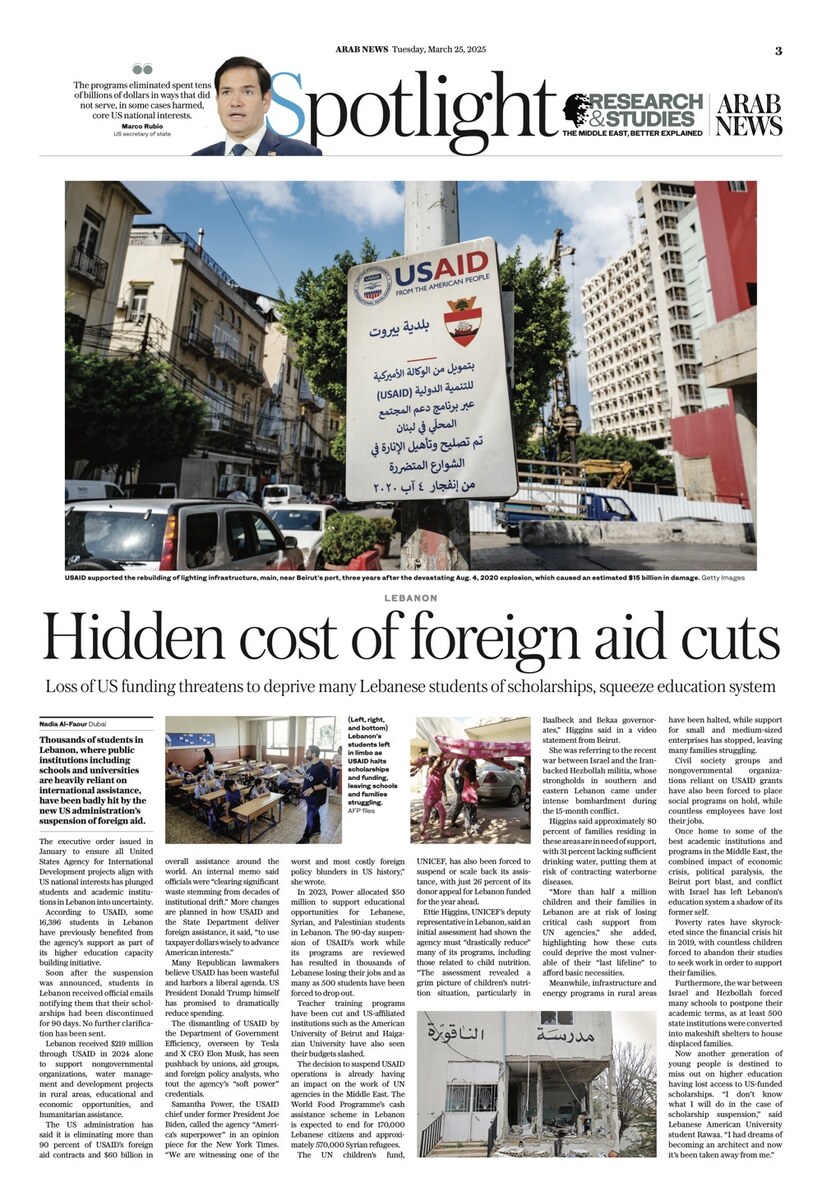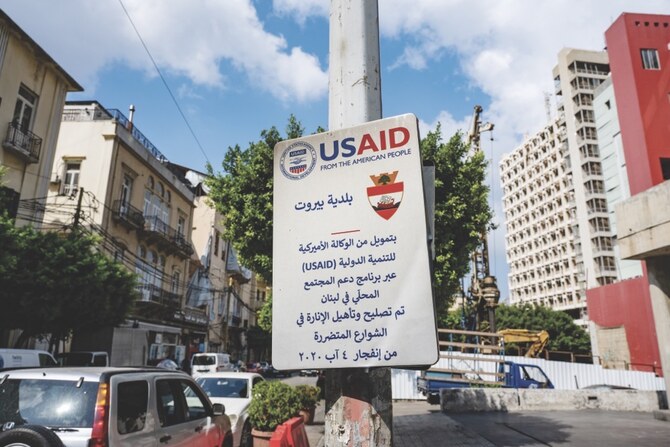DUBAI: Thousands of students in Lebanon, where public institutions including schools and universities are heavily reliant on international assistance, have been badly hit by the new US administration’s suspension of foreign aid.
The executive order issued in January to ensure all United States Agency for International Development (USAID) projects align with US national interests has plunged students and academic institutions in Lebanon into uncertainty.
“My parents cannot afford to keep me enrolled if I lose my scholarship,” Rawaa, an 18-year-old university student attending the Lebanese American University, told Arab News. “Even if I worked day and night, I would not be able to cover a fraction of my tuition.”
According to USAID, some 16,396 students in Lebanon have previously benefited from the agency’s support as part of its higher education capacity building initiative.
Soon after the suspension was announced, students in Lebanon received official emails notifying them that their scholarships had been discontinued for 90 days. No further clarification has been sent.

Some 16,396 students in Lebanon have previously benefited from USAID’s support. (AFP/File)
“I have been obsessively refreshing my inbox and my news feed to see if there are any updates concerning the continuation of the USAID scholarship,” said Rawaa, but to little avail.
Lebanon received $219 million through USAID in 2024 alone to support nongovernmental organizations, water management and development projects in rural areas, educational and economic opportunities, and humanitarian assistance.
The US administration has said it is eliminating more than 90 percent of USAID’s foreign aid contracts and $60 billion in overall assistance around the world. An internal memo said officials were “clearing significant waste stemming from decades of institutional drift.”
More changes are planned in how USAID and the State Department deliver foreign assistance, it said, “to use taxpayer dollars wisely to advance American interests.”
Many Republican lawmakers believe USAID has been wasteful and harbors a liberal agenda. US President Donald Trump himself has promised to dramatically reduce spending and shrink the federal government.
The dismantling of USAID by the Department of Government Efficiency, or DOGE, overseen by Tesla and X CEO Elon Musk, has seen pushback by unions, aid groups, and foreign policy analysts, who tout the agency’s “soft power” credentials.
Samantha Power, the USAID chief under former President Joe Biden, called the agency “America’s superpower” in an opinion piece for the New York Times. “We are witnessing one of the worst and most costly foreign policy blunders in US history,” she wrote.

The dismantling of USAID DOGE has seen pushback by unions, aid groups, and foreign policy analysts. (AFP/File)
“Future generations will marvel that it wasn’t China’s actions that eroded US standing and global security but rather an American president and the billionaire he unleashed to shoot first and aim later,” she added, in reference to Musk.
In 2023, Power allocated $50 million to support educational opportunities for Lebanese, Syrian, and Palestinian students in Lebanon. Some $15 million was earmarked for 140 university students, while the remainder went to thousands of younger disadvantaged students.
The 90-day suspension of USAID’s work while its programs are reviewed has resulted in thousands of Lebanese losing their jobs and as many as 500 students, who relied on American-funded scholarships, have been forced to drop out.
Teacher training programs have been cut and US-affiliated institutions such as the American University of Beirut, the Lebanese American University, and Haigazian University have also seen their budgets slashed.
USAID is an independent agency established by President John F. Kennedy in 1961. It has long been a lifeline for programs in health, disaster relief, environmental protection, development, and education across the Middle East, Eastern Europe, Africa, Asia and Latin America.

Teacher training programs have been cut and US-affiliated institutions. (AFP/File)
The decision to suspend its operations is already having an impact on the work of UN agencies in the Middle East. The World Food Programme’s cash assistance scheme in Lebanon is expected to end for 170,000 Lebanese citizens and approximately 570,000 Syrian refugees.
The UN children’s fund, UNICEF, has also been forced to suspend or scale back its assistance, with just 26 percent of its donor appeal for Lebanon funded for the year ahead.
Ettie Higgins, UNICEF’s deputy representative in Lebanon, said an initial assessment had shown the agency must “drastically reduce” many of its programmes, including those related to child nutrition.
“The assessment revealed a grim picture of children’s nutrition situation, particularly in Baalbeck and Bekaa governorates, which remained densely populated when they were repeatedly targeted by airstrikes,” Higgins said in a video statement from Beirut.
She was referring to the recent war between Israel and the Iran-backed Hezbollah militia, whose strongholds in southern and eastern Lebanon came under intense bombardment during the 15-month conflict.
Higgins said approximately 80 percent of families residing in these areas are in need of support, with 31 percent lacking sufficient drinking water, putting them at risk of contracting waterborne diseases.

The combined impact of economic crisis, political paralysis, the coronavirus pandemic, the Beirut port blast, and conflict with Israel has left Lebanon’s education system a shadow of its former self. (AFP/File)
“More than half a million children and their families in Lebanon are at risk of losing critical cash support from UN agencies,” she added, highlighting how these cuts could deprive the most vulnerable of their “last lifeline” to afford basic necessities.
Meanwhile, infrastructure and energy programs in rural areas have been halted, while support for small and medium-sized enterprises has stopped, leaving many families struggling.
Civil society groups and nongovernmental organizations reliant on USAID grants have also been forced to place social programs on hold, while countless employees have lost their jobs.
Once home to some of the best academic institutions and programs in the Middle East, the combined impact of economic crisis, political paralysis, the coronavirus pandemic, the Beirut port blast, and conflict with Israel has left Lebanon’s education system a shadow of its former self.
Poverty rates have skyrocketed since the financial crisis hit in 2019, with countless children forced to abandon their studies to seek work in order to support their families.

Many Republican lawmakers believe USAID has been wasteful and harbors a liberal agenda. (AFP/File)
Furthermore, the war between Israel and Hezbollah forced many schools to postpone their academic terms, as at least 500 state institutions were converted into makeshift shelters to house displaced families.
Now another generation of young people is destined to miss out on higher education having lost access to US-funded scholarships.
“I don’t know what I will do in the case of scholarship suspension,” said Lebanese American University student Rawaa. “I had dreams of becoming an architect and now it’s been taken away from me.”















